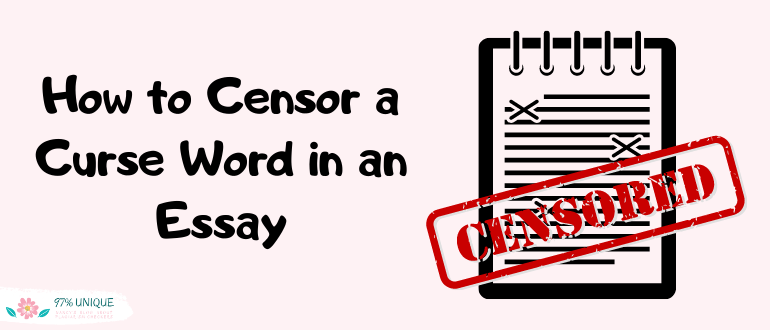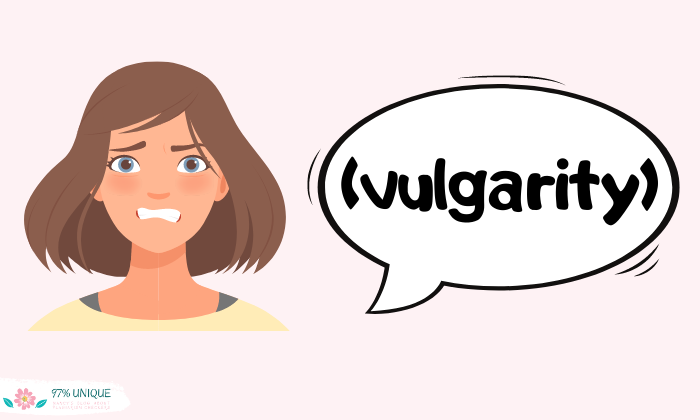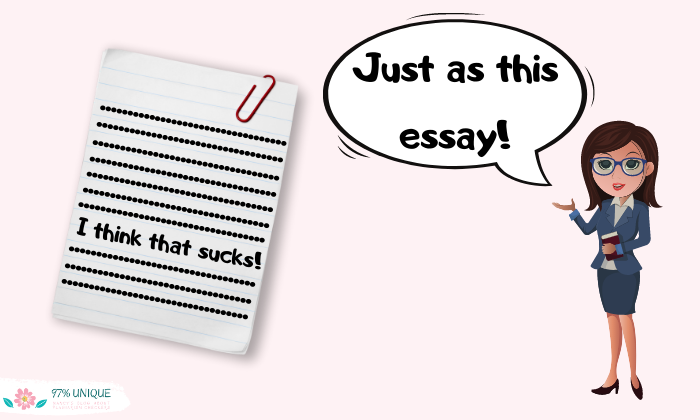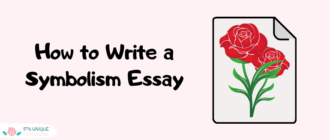
You’re working on an essay, and for one reason or another, you need to use curse words. What do you do? How to censor swear words in writing?
You need to consider both the audience and the purpose of your essay before deciding how to proceed.
When you finish reading this article and all the great links I’ve found for you, you’ll be able to do the following:
- Assess the purpose and audience you’re writing for.
- Identify whether using curse words is appropriate and why.
- Use curse words appropriately.
- How to censor a curse word in an essay effectively when necessary.
- Warn a reader that the essay uses curse words.
- Identify whether you should use other informal, negative words in an essay.
As a long-time professional writer and teacher of writing, I’ve written many essays and other pieces both with and without curse words. I can help you figure out when you should and shouldn’t use this kind of language and how to replace it when you need to.
Why Do You Need Curse Words?
While some people may pepper their speech with curse words, using them casually, they can also convey strong emotions. If you simply leave out a curse word, you might not adequately get across the power of a person’s emotions about a topic.

Curse words can also tell us something about a person and an environment. Nearly everyone uses curse words in just about every type of situation, but when and how a person uses them can add extra information.
For example, if you wrote about someone using a curse word in the middle of a serious religious ceremony or legal proceedings, this would be different from them doing so in a group of friends.
In her essay on “what makes swearing offensive,” philosophy lecturer Rebecca Roache digs deep into how cursing works and argues that inherent in the effectiveness of swearing is the knowledge that the audience will find the word offensive.
Me, on swearing, in @aeonmag https://t.co/9uWsnpNfdp
— rebecca roache (@rebecca_roache) February 22, 2016
This is important for you to think about when you considering how swearing appears in your essay. If you use it not as quote but in directly addressing your audience, you could be putting them on the defensive.
This is not necessarily a bad thing, but you should be aware of how cursing will be received.
What Are You Writing and Who Is It For?
The first thing to take into account is what you are writing. Writing an essay or a research paper is different from writing fiction.
The other thing to consider is the audience for your work. If you’re writing an essay for a magazine or website that considers itself contemporary and cutting-edge, this is very different from writing a college application essay.
If you are struggling with how to get started with your essay at all, the video above is a great short introduction to writing an essay. It breaks it down into an easy to follow step-by-step guide that can take you from idea to revision.
Should You Use Curse Words in an Essay?
It would be easy to answer this question by just saying that if there is any question about whether this is appropriate, you should err on the side of caution and avoid it.
Unfortunately, the reality is not quite so simple. If you have done interviews with people for research purposes and you alter the language they have used, even if it is vulgar, you risk misrepresenting your research.

Another consideration is that you cannot always predict what might be offensive to a certain audience and that what is considered a curse word can even change over time. Furthermore, if you are writing for posterity, people need to be able to look back decades or perhaps even hundreds of years later and get an accurate recounting of how people spoke.
For example, maybe you are writing about the topic discussed in this article, someone who inspired you. You might want to include a quote from that person even though it has a curse word in it.

There are also situations in which a curse word really is appropriate. For example, if you are writing about an assassin and the strongest word he ever uses is “darn,” what you are writing is not going to seem very believable.
Irish writer Paul McVeigh addresses the use of swearing in his fiction. He points out that “a brutal environment begets a brutal language” and that it would not accurately reflect the world he was writing about if he left this out.
In this #essay I discuss #swearing, #workingclassvoices, #Belfast & my first #shortstory which became #TheGoodSon https://t.co/BwuBwCCX0p
— Paul McVeigh Writer (@paul_mc_veigh) July 27, 2017
On the other hand, there are audiences for whom you should clearly avoid cursing, such as very young children. In most professional contexts outside of case studies or other situations where you need to quote people, it would not be appropriate to use curse words not would it be appropriate in a scholarship or college admissions essay.
Censoring Curse Words
What if you really do need to use a curse word, but you are worried about how it will be received by your intended audience? How to censor the f word in writing?
If you are writing for an editor, this is exactly what editors are for. If you are unsure, it’s fine to check with the editor and see what the policy of the publication that you are writing for is.
If you are writing for a class, you can also ask your professor.

There are a couple of reasons that you might want to censor the curse word.
One reason is that it might cause offense, and you do not want your audience to stop reading!
However, there is another reason that is related to but not quite the same thing as causing offense. Sometimes, a misplaced curse word can be distracting from your overall point.
So, the next question is how to censor a curse word in an essay when you need to.
Sometimes, when you need to leave out a word or phrase, an ellipses is appropriate. However, it is not the best choice in this situation because you still want to indicate that swear words are used, and an ellipsis does not necessary convey this.

The Associated Press puts out a style guidebook for journalists, and they have good advice about the question: How to censor swear words in writing?
First, they say that you should only use obscenities as part of a direct quote and when there is a good reason for them.
Otherwise, there are two options. You can either use the first word of the swear word followed by several dashes, such as d—, or you can insert a placeholder in parenthesis. (Expletive), (vulgarity) or (obscenity) would all be appropriate.

Personally, I think the second option of using a placeholder in parentheses is a better one. Using the first letter followed by a dash just looks old-fashioned to me.
Should You Warn the Reader?
You want the reader to be on your side, right? That means that if you have determined that you do need to use a curse word, you might want to warn the reader.
The AP has you covered here as well.
Their suggestion that you include a note at the beginning of your piece that says something like “Story contains vulgarities” is a good way to give your reader a heads up if you think it is necessary.
Does this seem like a lot to consider? One reason that writing an essay can feel overwhelming is that it can be time-consuming even for experienced writers.
The above video has some great time management tips that will help you make the overall process more efficient.
What About Not-Quite-Swear-Words?
There are other words that are not curse words but that are negative and maybe too informal for essay writing.
Examples might be “I think that sucks” or “She said something gross.”
Unless you are quoting someone directly, you shouldn’t use these words in essay writing. They are too informal and will reflect badly on you, the writer, even though they aren’t actually offensive.

What if you are doing a presentation instead of writing a paper? The same principles apply about determining the appropriateness of curse words just as you still need to make sure you have avoided plagiarism as discussed here.
Useful Resources
- What is an argumentative essay?
- How to write an essay introduction
- How to write a college essay
- Ending the essay: conclusions
Conclusion
Understanding how powerful language can be and how to present it to your reader is an important part of becoming a strong writer.
You might want to save your decision about how to censor a curse word in an essay for the later stages of your work when you are also checking for things like avoiding plagiarism, as described here.
Deciding when and how to use or censor a curse word in your essay is a matter of balancing the needs of your audience with the integrity of your writing, and the article and links above can help you find that balance.





